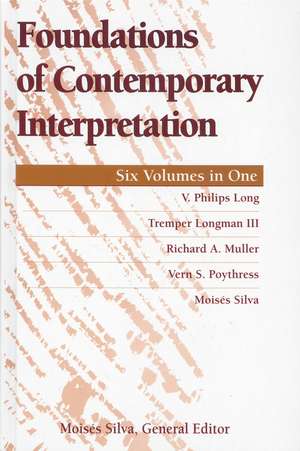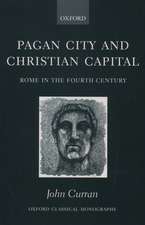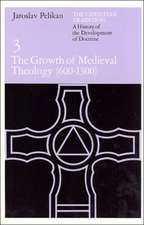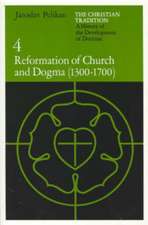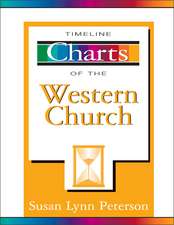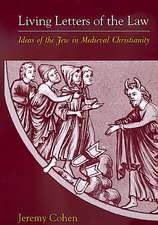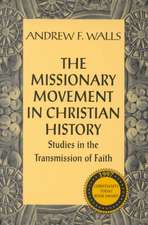Foundations of Contemporary Interpretation
Autor V. Philips Long, Tremper Longman III, Richard Muller, Vern S. Poythress, Moisés Silvaen Limba Engleză Paperback – 23 aug 1996
Preț: 248.81 lei
Nou
Puncte Express: 373
Preț estimativ în valută:
47.62€ • 51.70$ • 39.100£
47.62€ • 51.70$ • 39.100£
Carte disponibilă
Livrare economică 01-15 aprilie
Preluare comenzi: 021 569.72.76
Specificații
ISBN-13: 9780310208280
ISBN-10: 0310208289
Pagini: 690
Dimensiuni: 152 x 229 x 38 mm
Greutate: 0.68 kg
Ediția:Revised
Editura: Zondervan Academic
Colecția Zondervan Academic
Locul publicării:Grand Rapids, United States
ISBN-10: 0310208289
Pagini: 690
Dimensiuni: 152 x 229 x 38 mm
Greutate: 0.68 kg
Ediția:Revised
Editura: Zondervan Academic
Colecția Zondervan Academic
Locul publicării:Grand Rapids, United States
Descriere
Foundations of Contemporary Interpretation seeks to identify and clarify the basic problems of interpretation that affect our reading of the Bible today. This unique volume provides a comprehensive and systematic coverage of the field of general hermeneutics. Foundations of Contemporary Interpretation examines the impact of specific academic disciplines on the interpretation of the Bible. Previously published as separate volumes, its various sections explore the interface between hermeneutics and literary criticism, linguistics, history, science, and theology. Included in Foundations of Contemporary Interpretation, each with its own separate table of contents, are: -Has the Church Misread the Bible? -- Moises Silva -Literary Approaches to Biblical Interpretation -- Tremper Longman III -God, Language, and Scripture -- Moises Silva -The Art of Biblical History -- V. Philips Long -Science and Hermeneutics -- Vern S. Poythress -The Study of Theology -- Richard A. Muller. These six sections cover the interface between hermeneutics and the major disciplines.
Cuprins
AbbreviationsHAS THE CHURCH MISREAD THE BIBLE?Moisés SilvaPreface1. Today’s Hermeneutical Challenge2. Obstacles in the Study of the History of Interpretation3. Literal or Figurative?4. Clear or Obscure?5. Relative or Absolute?EpilogueFor Further ReadingLITERARY APPROACHES TO BIBLICAL INTERPRETATIONTremper Longman IIIEditor’s PrefaceAcknowledgmentsIntroductionSECTION ONE: THEORY1. A Historical Survey2. An Appraisal of the Literary Approach3. Basic PrinciplesSECTION TWO: APPLICATION4. The Analysis of Prose Passages5. Examples of Prose Analysis6. The Analysis of Poetic Passages7. Examples of Poetic AnalysisEpilogueFor Further ReadingGOD, LANGUAGE AND SCRIPTUREMoisés SilvaPreface1. Introduction2. Biblical Perspectives on Language3. The Scientific Study of Language4. The Historical Dimension5. Describing the Biblical Languages (I)6. Describing the Biblical Languages (II)7. Epilogue---Passing It OnAppendix: The Biblical Languages in Theological EducationFor Further ReadingTHE ART OF BIBLICAL HISTORYV. Philips LongEditor’s PrefaceAuthor’s PrefaceIntroduction1. History and the Genre(s) of the Bible: Is the Bible a History Book?2. History and Fiction: What Is History?3. History and Truth: Is Historicity Important?4. History and Modern Scholarship: Why Do Scholars Disagree?5. History and Hermeneutics: How Then Should We Read the Bible “Historically”?6. An Extended Example: The Rise of SaulEpilogueFor Further ReadingSCIENCE AND HERMENEUTICSVern S. PoythressEditor’s Preface1. How Should We Interpret the Bible?2. The Influence of Natural Science on Biblical Interpretation3. Thomas Kuhn and Contemporary Discussions of Scientific Discovery4. Implications of Kuhn’s Theory for Biblical Interpretation5. Differences Between Biblical Interpretation and Science6. Disciplinary Matrices in Biblical Interpretation7. Models in Science and in Biblical Interpretation8. Analogies as Perspectives9. Lessons to Be Learned from the Contextual Character of Knowledge10. Using Perspectives11. Biblical Interpretation Reorganized Using Different Perspectives12. Prospects for Deepening Our Understanding of the BibleAppendix: Interpretive Method and Other Fields of ResearchTHE STUDY OF THEOLOGYRichard A. MullerEditor’s PrefaceIntroduction1. The Study of Theology: Issues and Problems2. The Theological Disciplines: Biblical and Historical Foundations3. The Theological Disciplines: Contemporary Statement and Practice4. The Unity of Theological DiscourseEpilogue: The Study of Theology as an Exercise in Christian CultureFor Further ReadingIndex of Biblical PassagesIndex of Modern Authors and TitlesIndex of Subjects
